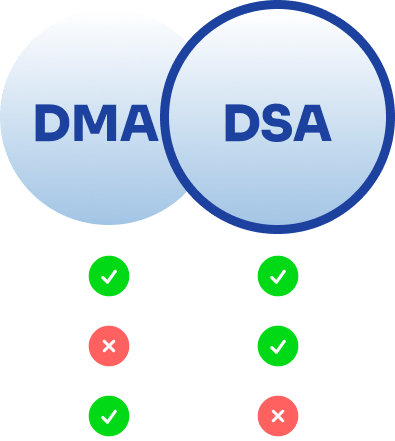Introduction
The Digital Markets Act (DMA) and the Digital Services Act (DSA) have been formulated by the European Union (EU) as a response to the challenges posed by the digital world. These two legislative frameworks share a common goal of regulating digital markets but differ in scope, focus, and intended impact. The DMA primarily addresses the dominance of large technology companies in the EU market and their potential impact on competition. It aims to ensure fair competition and equal opportunities for all players in the digital market.
On the other hand, the DSA focuses on the accountability of online platforms and aims to create clear and transparent rules for digital service providers. This legislation aims to protect users from harmful content and ensure their safety online. This article explores the intricate differences between the Digital Services Act package, the DMA, and the DSA, highlighting their respective contributions to shaping the digital future of the EU.
Understanding the Digital Services Act (DSA)
The Digital Services Act (DSA) is a regulatory initiative primarily targeting online intermediaries and platforms, such as online marketplaces, social networks, and content-sharing platforms. Its objective is establishing a comprehensive regulatory framework to govern these entities, fostering a safer online environment and protecting users’ rights, including minors, in the digital sphere. The DSA proposes various measures to achieve this, including introducing due diligence obligations for service providers to curb the dissemination of illegal content and ensure consumer welfare. These obligations apply to online platforms that host user-generated content, such as social media sites and online search engines, and require them to take adequate measures to detect and remove illegal content.
Additionally, the DSA proposes the establishment of a digital services coordinator in each EU member state responsible for monitoring compliance with the new rules. The DSA’s provisions also include measures to promote fairness and transparency in online advertising, such as requiring platforms to disclose the criteria used to display ads and banning targeted ads based on sensitive personal data. Overall, the DSA aims to create a more accountable and transparent online environment for all users.
The scope of the Digital Markets Act (DMA)
The Digital Markets Act (DMA) is a regulation proposed by the European Union focused on competition and antitrust matters within the digital sector. It intends to give the European Commission the authority to identify specific digital platforms as “gatekeepers,” recognizing their substantial role as intermediaries between businesses and consumers on very large online platforms. This designation will enable the DMA to address concerns about market power, ensuring a fair and competitive environment for businesses. The DMA’s objective is to create a level playing field for businesses in the digital sector, as gatekeepers’ power can make it difficult for new entrants to compete.
This regulation differs from the Digital Services Act’s (DSA) focus on consumer protection, demonstrating the DMA’s emphasis on promoting a competitive digital economy. By introducing the DMA, the European Union aims to ensure digital markets work efficiently and transparently, benefiting consumers and businesses.

Regulatory framework and legislative authority
While both acts fall under the EU’s digital strategy umbrella, the regulatory framework and legislative authority they wield differ significantly. The DSA is more centered on consumer protection law and ensuring a safe digital environment, operating within the realm of information society services. On the other hand, the DMA leans towards competition law, aiming to prevent unfair practices by digital platforms holding a substantial market share.
Obligations imposed on companies
Regarding obligations imposed on companies, the DSA introduces due diligence obligations, requiring service providers to take measures to address the risks associated with their services. This includes proactive measures to counter the spread of illegal content, protect minors online, and ensure the integrity of the online environment. Conversely, the DMA focuses on gatekeepers, imposing stricter obligations on very large online platforms with a significant impact on the internal market.
Designation of gatekeepers
A defining feature of the DMA is the power vested in the European Commission to designate certain digital platforms as gatekeepers. A gatekeeper is described as a company offering a fundamental platform service to over 45 million monthly active end users within the EU and catering to more than 10,000 yearly active business users based in the EU. This designation is based on the platform’s substantial connection between businesses and consumers, acknowledging their influence on the digital market. This contrasts with the DSA, which applies a broader scope to online intermediaries without a specific focus on market dominance or gatekeeping roles.
Competition and antitrust measures
The DMA introduces comprehensive measures to address competition and antitrust issues, signaling a commitment to creating a fair and level playing field within the digital sector. It broadens the range of existing measures for investigating and correcting market practices by large platforms, thereby aiming to prevent and rectify practices that could stifle competition and innovation. The DSA, while contributing to a safer online environment, does not delve into the same depth regarding competition-related matters.
Market power and investigations
An essential distinction lies in the focus on market power and investigations. By designating gatekeepers and imposing stricter obligations, the DMA addresses concerns related to market power held by very large online platforms. This is a proactive approach to prevent monopolistic practices that could hinder the growth of smaller players. In contrast, the DSA, while regulating online intermediaries, does not delve into the specific market power dynamics.
Stricter obligations for a very large online platform
The DMA’s emphasis on stricter obligations for very large online platforms reflects a targeted approach to entities with a significant impact on the internal market. This recognizes the influence these platforms wield and seeks to mitigate any potential abuse of their market position. The DSA, while comprehensive in its approach, does not impose the same level of scrutiny on very large platforms, focusing more broadly on various online intermediaries.

Consumer welfare and digital economy
The distinction between the DSA and DMA becomes more apparent when considering their impact on consumer welfare and the digital economy. The DSA, through its due diligence obligations, strives to create a safer online space, safeguarding users and their rights. Conversely, the DMA’s focus on competition aims to stimulate a thriving digital economy by ensuring fair competition and preventing anti-competitive practices that could hinder innovation and market growth.
Flexibility and adaptability
Another crucial aspect is the flexibility and adaptability of the two acts. The DSA, with its emphasis on consumer protection and due diligence, provides a framework that can adapt to evolving challenges in the digital realm. In contrast, the DMA, focusing on competition, aims to create a stable and competitive digital market by regulating the conduct of very large online platforms. The rigidity in its approach reflects the need for consistent rules to address market power dynamics.
Role of the European Commission
The role of the European Commission in implementing and overseeing these acts is instrumental. The DSA grants the Commission authority to ensure effective enforcement, coordination among EU member states, and cooperation with relevant stakeholders. The DMA empowers the Commission to designate gatekeepers and conduct market investigations, demonstrating a proactive stance in addressing potential competition concerns within the digital sector.
Safeguarding minors online
Safeguarding minors online is a specific focus of the DSA, acknowledging the vulnerability of young users in the digital space. The DSA establishes a comprehensive framework for promoting a safe online environment for children and adolescents by introducing measures to protect minors from harmful content and activities. While indirectly contributing to a secure digital environment, the DMA places a greater emphasis on competition-related matters.
Intellectual property rights and due diligence
Both acts address intellectual property rights but from different perspectives. The DSA, through its due diligence obligations, requires service providers to take measures to protect intellectual property and combat the spread of counterfeit goods online. On the other hand, while acknowledging the importance of intellectual property rights, the DMA primarily focuses on competition-related aspects and the conduct of gatekeepers in the digital market.
Business models and digital transformation
The impact of the DSA and DMA on business models and digital transformation is significant. By imposing due diligence obligations, the DSA encourages a responsible business model that prioritizes user safety and compliance with regulations. In contrast, the DMA’s focus on competition and market dynamics aims to foster innovation and digital transformation by preventing anti-competitive practices and ensuring a level playing field for all digital companies.

Liability rules and responsibilities
Liability rules and responsibilities differ between the DSA and DMA. The DSA, through its due diligence obligations, seeks to hold online intermediaries accountable for the content circulating on their platforms, aiming to reduce the dissemination of illegal content and protect user rights. By designating gatekeepers, the DMA places specific responsibilities on very large online platforms to ensure fair competition and prevent market abuses, reflecting a different dimension of accountability.
Data sharing and privacy
Both acts touch upon data sharing and privacy but with distinct perspectives. The DSA, in its due diligence framework, emphasizes the protection of personal data and user privacy as integral components of creating a safe digital environment. While recognizing the importance of personal data, the DMA places a more significant focus on competition-related issues, such as ensuring fair access to data and preventing the exploitation of market power by gatekeepers.
App stores and tech firms
A notable aspect of the DSA is its coverage of app stores and tech firms, bringing these entities under the regulatory umbrella to ensure adherence to due diligence obligations. In contrast, the DMA’s scrutiny is directed at very large online platforms serving as gatekeepers, reflecting a more targeted approach to addressing market dynamics and competition issues within the digital sector.
Market investigations and legal certainty
The DMA introduces market investigations as a proactive measure to ensure legal certainty and address potential competition concerns within the digital market. This reflects a commitment to a robust regulatory framework that can adapt to evolving challenges. The DSA, while providing a comprehensive set of rules, may lack the same level of legal certainty due to its broader focus on consumer protection and diverse online intermediaries.
Conclusion
As the digital landscape in the European Union continues to evolve, it is crucial to grasp the critical differences between the DMA (Digital Markets Act) and the DSA (Digital Services Act). While the DSA focuses on safeguarding consumer protection, the DMA aims to establish a fair and competitive digital economy. Notably, the DSA applies to all digital services, whereas the DMA has a more targeted approach, applying to large online platforms that act as gatekeepers.
As these legislative frameworks come into effect, their future implications will gradually unfold, shaping the trajectory of digital innovation, competition, and user protection within the EU. Understanding the nuances of the DMA and the DSA will be paramount for stakeholders in the digital industry and policymakers alike.







